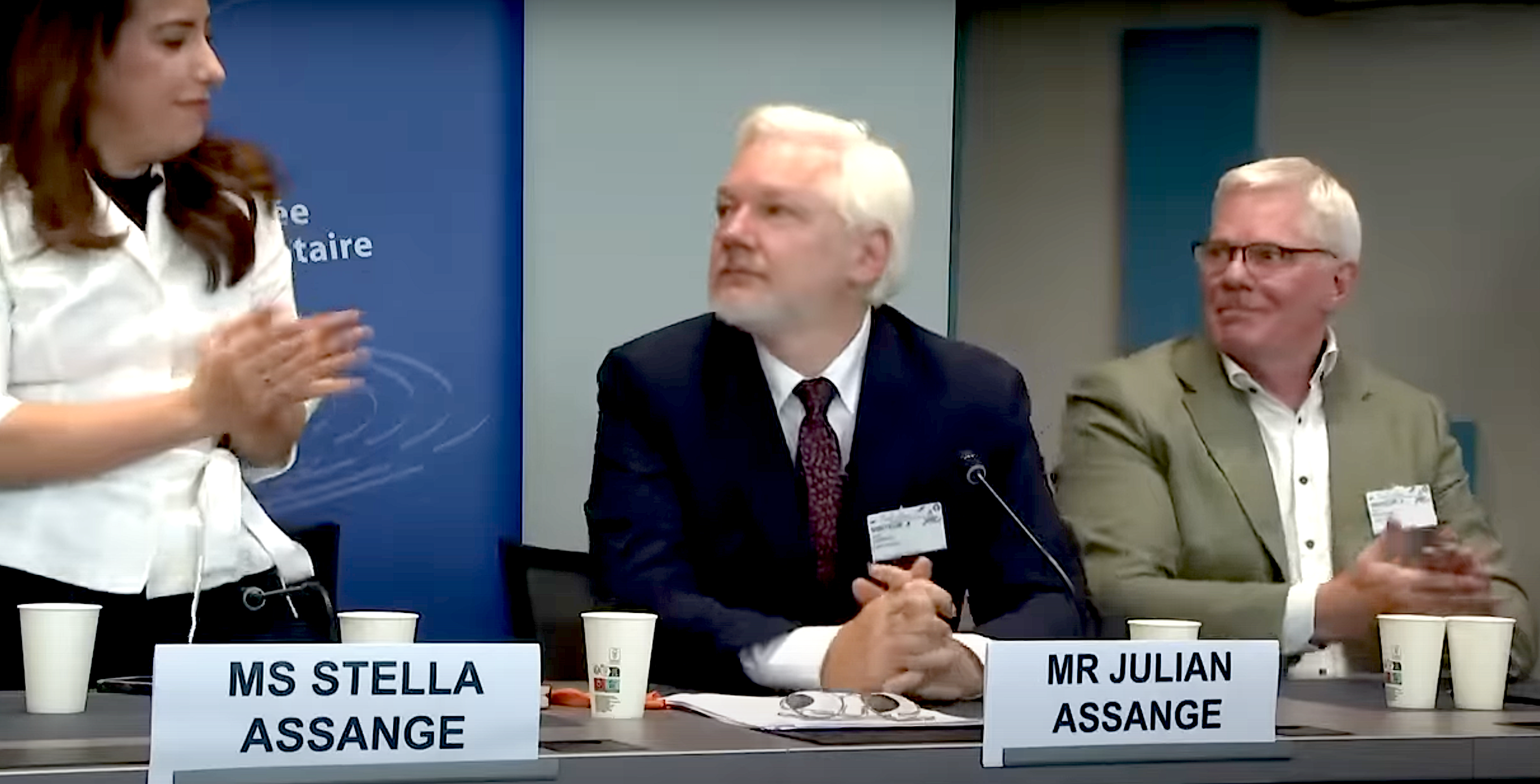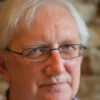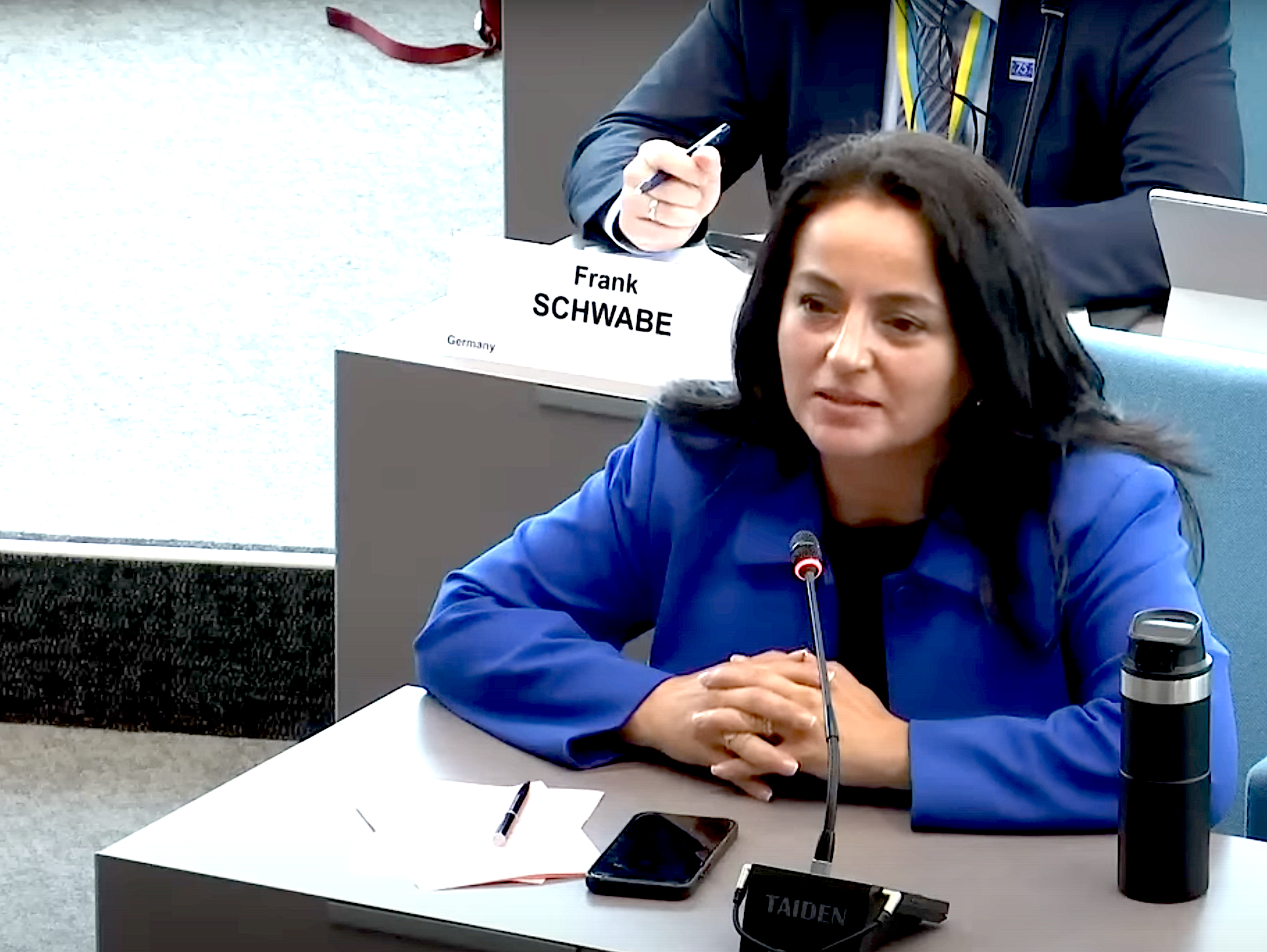PACE’s designation of Julian Assange as a political prisoner was the only part of the European Council’s resolution on which the Atlanticists even attempted to mount a rearguard action.

Stella Assange applauding her husband at the end of his presentation to the Parliamentary Assembly of the Council of Europe on Oct. 1. Kristinn Hrafnsson, editor in chief of WikiLeaks, on right. (PACE video still)
By Craig Murray
CraigMurray.org.uk
 At the end of Julian Assange’s testimony before the Judicial Committee of the Parliamentary Assembly of the Council of Europe, 95 percent of the entire room of 220 people rose in a standing ovation.
At the end of Julian Assange’s testimony before the Judicial Committee of the Parliamentary Assembly of the Council of Europe, 95 percent of the entire room of 220 people rose in a standing ovation.
The audience consisted of members of the Parliamentary Assembly, who are delegated members of their national parliaments, from all over Europe. Furthermore they included members of the full European political spectrum, including the dominant national parties.
The audience also included Council of Europe staff and experts, and worldwide media. Note this well — and I have never witnessed anything remotely like this — the 100 or so media representatives all stood and joined in the applause. I need to stress this was largely not the alt media, but the legacy media in all its pomp.
Glancing up a level, they were even standing and applauding behind the glass of the interpreters’ booths.
The dignity and clarity of Julian’s Oct. 1 prepared statement and the stark honesty of his delivery provoked this reaction, coupled with sympathy for a man who has unjustly suffered extreme hardship and deprivation for years. I hope it was a valuable and affirming moment for Julian, so richly deserved.

Applause for Assange at the Council of Europe on Oct. 1. (PACE video still)
But I must confess I looked over at the applauding media, and thought how Julian had been slandered and traduced and his case entirely misrepresented for over a decade. I recalled how he had been wrongly represented for years as a sexual offender and as a lunatic who smeared excrement on walls.
Oh well … “there is more joy in heaven at one sinner that repenteth.” If the mainstream media are now willing to give positive coverage to Julian’s thoughts, that will be a good thing, as indeed largely happened over this event. His words on the assassination of journalists in Gaza and on the programming of targets in Gaza using AI were an excellent pointer towards where his thoughts are trending.
I also was very worried about Julian’s health. I do not wish in any way to detract from his extremely good performance and the success he had and deserved. But to me, the signs that he has not fully recovered yet were very obvious. His physical recovery appears to be complete; he looked fit and had lost that prison puffiness. But after years of isolation the brain takes longer to re-adapt to stimuli.
The old sparkle and fire were not yet quite there. His voice had little variation in tone and pitch, and a slight hesitation in delivery. He answered questions adequately and thoughtfully but the quickfire command was lacking and sometimes he appeared not to have caught the thrust of the question.
When asked a question by German MP Sevim Dagdelen — a constant friend and doughty campaigner for him for many years — he plainly did not recognise her and at that point declared himself too tired to continue.

Dagdelen at the Council of Europe during the Oct. 1 session with Assange. (PACE video still)
I am well acquainted with jet lag, and this was not just that.
I am also well acquainted with the effects of solitary confinement, having endured four months of it. Julian has endured 17 times more, preceded by eight years in the Ecuadorian embassy in London, with the added extreme pressure of not knowing when and even if it would ever end. Remember, as reported by Nils Melzer, U.N. special rapporteur on torture, and now reaffirmed by the Council of Europe, Julian’s treatment amounted to years upon years of torture.
Julian himself stated at the start of his presentation that “the years of isolation have taken their toll.” In a press conference afterwards, his wife Stella Assange stated that, without violating Julian’s privacy, his recovery is far from complete.
I hope that the support of the Council of Europe has given a real boost to Julian’s morale, but I also hope that he will now return to concentrate on his recovery and not seek to dive back into public affairs again too fast.
I see great pressures on Julian from those who wish, from the best of motives, to involve him in various causes in this crucial moment of crisis, of not just armed conflict, but a crisis of values and beliefs exacerbated by technology.
Julian indicated that his primary future interests may lie in AI, cryptology and neurotechnology and their uses and abuses. In the press conference without Julian, Kristinn Hrafnsson, editor in chief of WikiLeaks, said that the future of WikiLeaks and Julian’s role in it would be discussed, but Julian had only been free a few weeks and more time was needed before big decisions were taken.
I am sure this is right, and please take this article as a plea from me to everybody to leave Julian alone and give him more time — as much as he wants — fully to recover. He is a man, not a cause or a principle.
I might add here that obviously my own 14 years of work in campaigning to free Julian is done. This was a triumphant coda. Here I am looking very much younger making a speech outside the Ecuadorian embassy on the day Julian entered it:
Here I am more than a decade later making a speech after his last High Court extradition appeal hearing:
It was a long, hard road in between, and one that took me across the world and caused me to meet so many wonderful campaigners and make so many wonderful friends, every one of whom contributed to the climate that eventually led to Julian’s release.
Enjoying champagne in Strassbourg with @Stella_Assange, @IFJGlobal president @DomPradalie, former British ambassador @CraigMurrayOrg and legal observer, @deepa_driver to celebrate @coe resolution on Julian #Assange based on @sunnago's report pic.twitter.com/1wT46p2KuR
— Stefania Maurizi (@SMaurizi) October 2, 2024
The Council of Europe is the grandfather of European institutions. It is not the European Union and is not the Organisation for Cooperation and Security in Europe. The Council of Europe’s mandate is to promote democracy and human rights, and it was a key instrument of detente, although Russia has recently left in protest at hypocrisy in the council’s targeting.
Unlike the European Union, the Council of Europe has no economic role. Unlike the European Parliament of the EU, which makes law in conjunction with the Council and Commission, the Parliamentary Assembly of the Council of Europe (PACE) is not a legislative body. Nor is it directly elected.
National parliaments of the member states of the Council of Europe send delegates from among their members to comprise PACE. So it consists of national domestic MPs.
(Watch Julian’s full speech and question and answer session, above.)
In the case of the U.K., several of these are members of the House of Lords. We therefore had the anomaly that the judicial committee before which Julian appeared, in a European body dedicated to promoting democracy, was chaired by a British politician for whom nobody had ever voted, Lord Richard Keen, a Scottish Tory.

Keen at the Parliamentary Council of Europe session with Assange on Oct. 1. (PACE video still)
The subsequent debate passed a resolution which specifically recognised that Julian Assange had been a political prisoner. This was the only aspect of the report and resolution on which the Atlanticists attempted to mount a rearguard action. They did not attempt to remove the elements on freedom of speech and information, on U.S. war crimes and ending impunity, on protection for whistleblowers, on abuse of judicial process, or on the appalling conditions of Julian’s detention. But they did try to remove the phrase political prisoner.
They failed. Only the extreme Atlanticists voted for the amendments to that effect, primarily from the British Conservative Party and the Polish Law and Justice Party. At the final vote on the resolution they could muster only 13 votes against to 88 for.
The reason that delegates from the Alliance of Liberals and Democrats for Europe Party (ALDE) and the European People’s Party (EPP) supported the resolution in PACE, when their colleagues in the European Parliament blocked such action, is that party leaderships take much less control in PACE. It was therefore able to set up a committee to investigate the case, with an excellent report produced by its Icelandic rapporteur.
I spoke with three members of the committee who all told me they had been shocked by how much the true facts of the case diverged from media accounts.
The European Parliament by contrast has refused to look at the Assange case at all. Both EPP and ALDE have point-blank refused to discuss it even at internal group meetings.
This PACE report has no enforcement clout, but it can make a real difference to perception. The PACE report and resolution on torture and extraordinary rendition, for example, to which I myself gave witness evidence, had a major effect on public and political opinion and in getting the media to accept those events as fact.
The European Court of Human Rights is a Council of Europe body. Resolutions of PACE are of interest to the ECHR. One thing we learnt from Julian is that his plea bargain contains provisions against him going to the ECHR over his treatment, and against making Freedom of Information requests.
I assume that if he breaks these conditions, there is a mechanism within the U.S.A. by which his prosecution or at least sentencing can re-open. But I cannot see how it could be enforced against him in Europe. The ECHR is not going to accept that the right to appeal over fundamental rights can be signed away in a coerced agreement, and I cannot see even the U.K. seeking to extradite somebody to the U.S. because they appealed to the ECHR.
It appears unthinkable.
It may be relevant that among Assange’s strangely large entourage were the Belgian and French lawyers who had been specifically tasked with preparing his appeal to the ECHR had the U.K. courts ordered his extradition. So watch this space…
It is also of note that PACE has selected Sweden for a Periodic Review of its human rights record beginning next year. Those behind the selection proposed it specifically so that a report can be produced that takes a deep dive into the extraordinary concoction of sexual assault allegations against Assange and their misuse by the authorities, as detailed in Nils Melzer’s remarkable book. So again, watch this space…
Craig Murray is an author, broadcaster and human rights activist. He was British ambassador to Uzbekistan from August 2002 to October 2004 and rector of the University of Dundee from 2007 to 2010. His coverage is entirely dependent on reader support. Subscriptions to keep this blog going are gratefully received.
This article is from CraigMurray.org.uk.
The views expressed are solely those of the author and may or may not reflect those of Consortium News.

I love the term “Atlanticists.” I’m sure they see themselves as the center of everything while their narrow North Atlantic reality Chunnel keeps the rest of the world neatly out of sight. Anything to the south, east, or even the western half of North America. And anyone not bravely facing the 19th century.
No wonder Assange was so horrible for them. Constantly hacking away at their thin armor; revealing them as power besotted fantasists. As the court of oligarchic empire and not at all the defenders of freedom and civilized decency they pretend to be.
while i wish julian assange all the time in the world for
his full recovery – if that is even possible after his ordeal -,
i must say that, in view of all the atrocities, all the moral
bankruptcies we see these days: to me, nothing appears
unthinkable anymore. alas.
i’ll watch this space, nonetheless ;-)
I was in Covid quarantine for ten days. I was surprised how much it affected me.
“One thing we learnt from Julian is that his plea bargain contains provisions against him going to the ECHR over his treatment, and against making Freedom of Information requests.”
Recall earlier reports that he is “not gagged.” This now appears incorrect. Evidently it would surely not do for the ECHR to offer a supportive disposition on this case to stand out as historical example. So, as to Craig’s “unthinkable” on possible re-extradition, come on. What we have seen is a State as Stazi as ruthless and venal as anything previous vs. a man “who pled guilty to journalism.”
The travesty of this “judgment” remains, sorry to say, but time and those fighting for his cause will continue. One day this “plea bargain” may be reversed.
Julian is a hero in many ways but his greatest achievement is to rip the mask of the face of western justice in the form of the USA and it junior partner the UK. Both captives of the Neocons who area form of activism for the Zionists
Well spoken, Craig Murray. I would propose Julian Assange for the Nobel Peace Prize on the basis of Murray’s remarks.
Agree with everything you say Mr. Murray. The worldwide support and campaigning for Julian in the last few years grew expotentially. I would like to believe it had a large part to play in his release. Big thankyou for the staunch and unstinting coverage of this injustice. And of course the same goes for Consortium News.